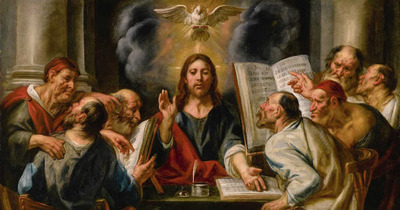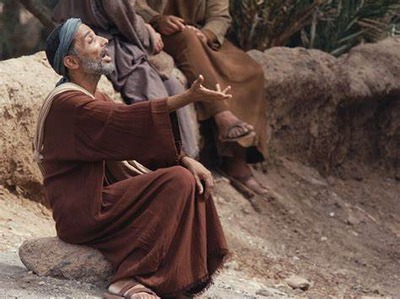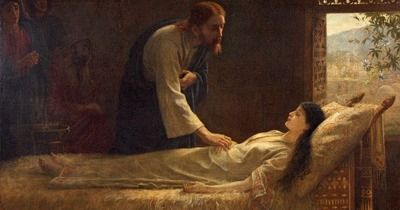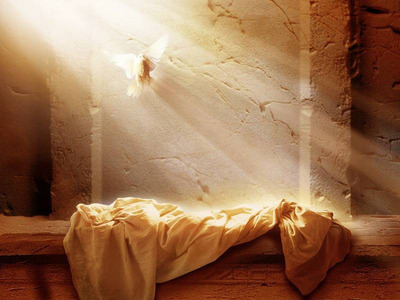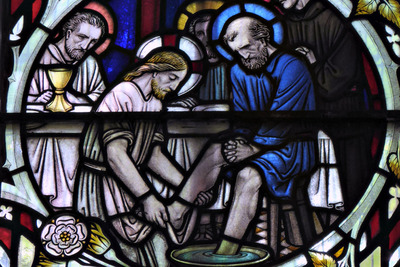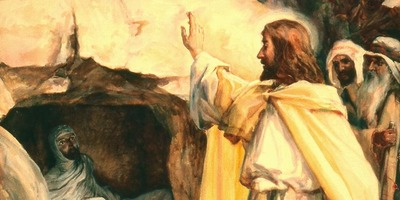May 11, 2025
|by N W
|
0 Comments
|
Comfort, Courage, Family, Grace, Guest Celebrants, Life, Temptation, Trust
Fourth Sunday of Easter
May 11, 2025 — Year C
Readings: Acts 13:14, 43-52 / Ps 100 / Rv 7:9, 14b-17 / Jn 10:27-30
by Msgr. Michael McCarron, Guest Celebrant
It’s such a joy to be here with you again today and over these next couple of weeks. It’s exactly the elixir that this retired priest needed: to have a parish community again for a while. So, thank you for that gift.
I said to someone at the last Mass, and I would repeat it, especially since it’s happened twice in a row: 8 o’clock is really early. Especially if you’re coming all the way from Lynchburg, which is not far, of course, but it means that, for me, I have to get up around 4:45 or thereabouts and get the dog settled and myself settled, so that I don’t come out bleary-eyed and mumbling things at Mass.
It’s always a joy for me to have the distance between my home in Lynchburg to this parish here in Bedford because of that drive. I come out on 460 and, I don’t know if you’ve ever tried it at that hour on a Sunday, when there’s almost no traffic, but that drive is absolutely delightful. It’s not usually delightful, especially if I’m behind you saying, “Hurry up!” But that’s my fault. This morning, however, when I came up it was just so awesome. There was a little haze across the fields, the deer were kind of bedding down. You could see them heading into the woodlands, instead of the middle of the road, like they usually do. It was just wonderful and very peaceful and a wonderful way to arrive, of course, to celebrate the Prince of Peace. It was really a gift.
And so, as I was driving along that 32.5 minutes, according to my GPS, that it takes to get here, I was immediately lulled into those wonderful spiritual thoughts, and I began to think about the median strip. I mean, really, about the median strip! I’ve always been fascinated by them. When you think about it, they’re the victims of violence, aren’t they? Somebody has come through what was once a pasture or a road, and just created this 4-lane highway, and left there in the middle, seemingly forgotten, this strip of land.
I admit that, if you’re a traffic engineer, and you’re here in the congregation, you shake your head and say “They’re there for a purpose.” Yes, I know they’re there for a purpose. They do serve a purpose: they separate the lanes and keep the lights down; they do all sorts of things! But there’s a study that says, since the late 1950s and early 1960s, when they began the interstate system and when road construction began to take in things like median strips for safety, a group of animals has begun to adapt to living in median strips. They don’t live anywhere else, because they can’t get off of the median strip. And if they do, they don’t get to the other side, generally speaking. So, there’s a whole life ecosystem going on.
As I’m driving down the road, I’m kind of watching how the wildflowers are coming up, how different things are happening in that median strip. And I thought to myself, I’d really hate to be a median strip, because they don’t go anywhere. They always stop at a bridge, or at an intersection, or something. They don’t go further. And if you’re one of those lucky animals who has decided this is home, well, you’re wrong because you don’t go anywhere, either.
Today our Lord talks, as he does on this Sunday every year, about the Good Shepherd. The readings we hear today have been proclaimed in the Church since the fourth century. This is part of the ancient lectionary, as pretty much all of Easter is. This particular one is called Shepherd Sunday, because all of the readings are about being a shepherd, doing shepherd-like things.
In Jesus’ day, it’s beautiful. We have this wonderful image of our Lord with a lamb across His shoulders. It’s very touching. But, of course, in Jesus’ day, if I called you a sheep, you would be really upset. It still is not complimentary. I mean, go to a friend of yours and say “You’re such a sheep,” and see if you get a happy response. You won’t.
In Jesus’ day, and in ours, sheep are very sweet. I mean, who doesn’t love a lamb? You just want to cuddle with them. But they’re dumb as a box of rocks. I grew up on a farm that had sheep, among other things, and you just couldn’t help but love them. They all have different personalities. But they don’t know anything. They can get spooked by a branch falling in a field a mile away. They run, once they’re spooked, until they drop. They don’t stop; they drop. If they’re left to their own devices, they exhaust themselves. They’re a catering service for wolves, basically. They don’t protect themselves; they can’t. They run and they are challenged and, if they fall in a creek, they turn over and they can’t turn themselves back. They get soaked in the wool and they drown.
They need a shepherd, and that is Jesus’ whole point. Goats are like the cats of the sheep world. They can do anything on their own. They have brilliant minds, they take care of themselves, they gather together and they push back any danger. They don’t really need a lot of help. Sheep in the wild need an awful lot of help. In fact, without the shepherd – and Jesus is making this very clear in the gospel of St. John – they won’t go anywhere. They stop.
But His sheep know him, and when He calls them, they come forward. This is important for people who are living in the median. And I hate to tell you, but we’re living in the median. That is to say, we live in a time when faith has been reduced to a kind of pausing. Faith has been reduced to trying not to stand out too much. Faith has become a kind of Catholic agnosticism. You know God exists. Everybody in this room believes that. We’re not sure He does anything. He doesn’t really intervene. He doesn’t really get on our side or have our back. When we are in trouble, we go to a lot of different places before we get to Him. He’s kind of our desperation point, isn’t He?
You see, Jesus is the Shepherd that we who live in the median – not quite sure, wanting to be sure, but OK about staying in one place – need. He’s the one who gets us off the median. We need a shepherd to see us across those four lanes. We need a shepherd to tell us that there really is life on the other side of that concrete: the concrete of our prejudices or our own grudges, the concrete of our opinions about ourselves when we look in the mirror and just don’t like what we see if we’re honest, the concrete of the difficulties we have with our kids, or we who are kids have with our parents. We need a shepherd to show us how to get off of that median safely.
Jesus says that they know My voice. They’ve heard what I’ve said to them. And I’ve put them into My hand. That is to say I will never let them go. I will never get them to come out into the road unless I can lead them safely to the other side. I will hold on to them. Our prejudices can be coming down the road at seventy-five miles an hour, and we could be in the middle of the road, but He’s not going to let us get hit by them if we stick with the Gospel.
When we’re at work, and everybody’s talking about the new Holy Father, and that he’s an American, as though the Holy Father can be minimalized into a nationality, we are able to stand up and profess our faith, and what it means to be one Church of enormous diversity, with an enormous broad Catholic reach. It means that Jesus, who has called us, has summoned us off the median because we’ve heard the voice of one person who makes more sense than all of the stuff we see on social media, the stuff that our computer can lure us to. It tells us that our sexuality is some kind of a playground, instead of a sacred gift, as sacred as the Eucharist is – a sacrament to be given to another with faithfulness, permanence, and love. We may feel like we’re in a pretty unsafe place. But living on the median, we can begin to think that sometimes the bad behaviors we compromise with, that we accept, in order not to seem different, just pass by. Those bad behaviors can suddenly begin to be a toxin that takes hold of us and changes us.
Today we celebrate Mother’s Day. We’re glad to celebrate our mothers. Hopefully we remember a Mom who taught us that there was a difference between love and hate, forgiveness and grudges. Hopefully, we remember a mother who, by her own example, showed us what she cares about.
Do you know what the first memory that comes to mind of my mother, at my ripe old age of almost seventy-four? It is of my mother putting rubbing alcohol on me when I was about twelve years old, because I had the flu and my fever had gone up into the dangerous zone. I don’t remember much else of that fever or of that time. I just remember her being at my bedside late at night, and bringing my fever down. Thanks, Moms. Happy day. I had a good shepherd. It looked an awful lot like my mother.
That’s, of course, the point. “The Father and I are one,” Jesus says. That means when they hear My voice, and they follow Me, they know that I can get them, allow them, help them, infuse them to be Me to others: Moms to their children, husbands to their spouses, children to their parents, elderly to the young, and bless the young, to us, who are older in years.
It’s funny to be on the median, isn’t it? It looks very peaceful, but sometimes it’s a little too peaceful. The median isn’t the woods. The woods give life to so many creatures. The medians give it only to a few that will accept the narrow boundaries as normal. We don’t. We’re Catholics. We have no boundaries. Our boundaries are as big as eternity, as long and as deep as grace. And we have a Shepherd who will never let us be extricated from His grasp. And He’s grabbed us, tight, with a hug that leads to everlasting life. Does it go somewhere? It goes on forever, as it should.
May Jesus be praised forever.
KEEP READING
 540-586-8988
540-586-8988 


